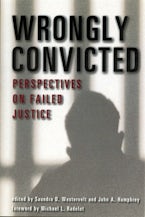The contributors to this collection discuss the many ways in which innocent criminal defendants can be convicted in a system that places great emphasis on protecting them. Some involve culpability: brutal or racially biased police and other officials, treacherous informants, and incompetent attorneys. . . . Recommended for upper-division undergraduates, graduate students, and faculty.
(Choice) An all-star set of contributors and clearly written essays make this a worthwhile addition to anti-death penalty literatures. Westervelt and Humphrey take a practical approach to the topic. Essays in Part 1 show that eyewitnesses are often wrong, police trick suspects into making confessions, informants lie to gain benefits, and police can be incompetent or venal. Part 2 argues that those who are unpopular, uneducated, or members of a racial minority invite harsher treatment by authorities. The next section offers case studies on convictions that were wrongly obtained. . . . This excellent introduction to a controversial topic is highly recommended.
(Library Journal) A very powerful addition to the debate on capital punishment.
- George Kelling (author of Fixing Broken Windows)

